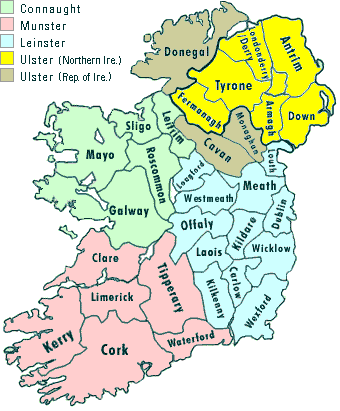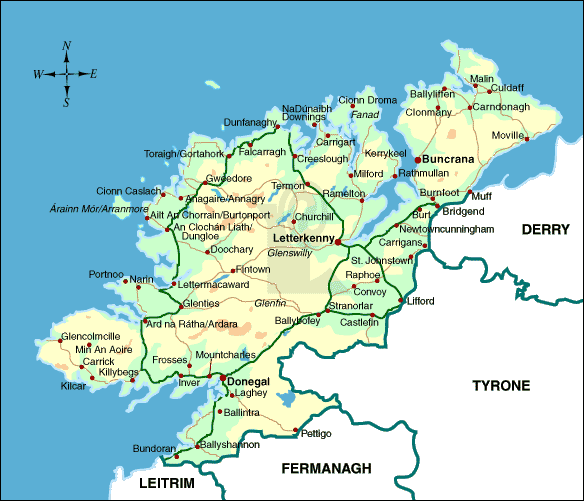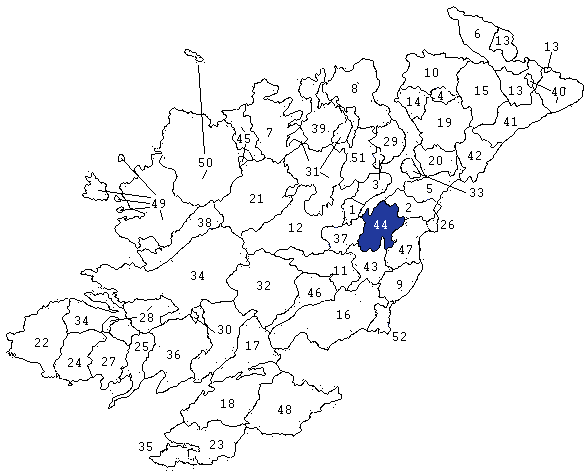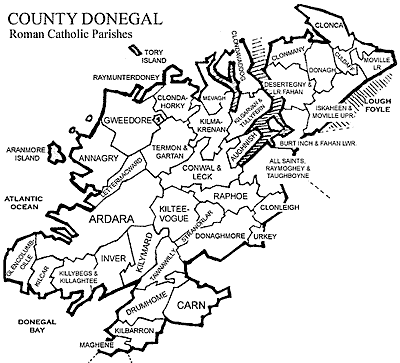Irish Influence
The following text is based on research from Mr J. Jordan, Namecraft - Heritage and Heraldry.
Ireland was one of the first countries in which a system of hereditary surnames arose, they were known in Ireland long before the Norman invasions, brought English-style surnames to the country. The Irish prefixes Mac (son of) and O (grandson or descendant of) gave rise at an early date to a set of fixed hereditary names in which the literal patronymic meaning was lost or obscured. Ó Daimhín, for example, is known as a hereditary byname from the 14th century onwards. During the long centuries of English domination, Irish surnames' were crudely Anglicised.
The Irish Gaelic language was proscribed and surnames were Anglicised phonetically or by translation. At its mildest, the prefixes Mac and O' were abandoned, so that O'Manachain and Mac an Fhailghigh became Mc Nally and then Nally. At worst, Irish surnames were distorted, beyond all recognition. Thus, Mac Giolla Eoin' son of the servant of Eoin' was transmuted into Munday by confusion of the name with Irish Luain, genitive of Luan Monday. O'Daimhín became Devine. Only since Irish independence in 1921 has a reversal set in, so that Irish people are now adopting Gaelicised forms of their names, even though they may not be able to speak the Irish Gaelic language. Gaelicisation of a surname has become a statement of national and political identity, so that some whose names are actually of Norman, French or English origin nevertheless create Gaelic versions of them.
Up to the fifteenth century the chief of the Devine sept was Lord of Tirkennedy in County Fermanagh. This branch is descended from "Daimhín" who died in 966, son of Cairbre Dam Argait, King of Oriel. The name Daimhín stems from daimh, meaning fox. A brother of Daimhín called Cormac was ancestor of the Maguires and the O'Devines, of Tirkennedy. The family was a leading County Fermanagh sept up until and including, the fifteenth century. Later the power of the Leading Family was broken by pressure from the O'Neills, in the north, and the Maguires in the south.
The name Devine is mainly found in Ireland today, in the counties of Tyrone and Fermanagh. Though the etymology of the name has been questioned, the scholar O'Donovan attests that it is, in Irish, O'Daimhín. This is also anglicised as Davin, which is not a common name, but it is to be found in and around County Tipperary. The Davins of the midlands are probably a branch of the O'Devines of Fermanagh and so ultimately an offshoot of the Maguires.
The Four Masters mention one O'Devine, (Dunchadh Ua Daimhene -who died in 1066), as coarb (hereditary possessor of church land) of Derry, as well as several who were chiefs of Tirkennedy at various dates up to 1427. The sept gave Clogher in County Tyrone its original name Clochar Mac nDaimhín.
Namecraft - Heraldry and HeritageJordan House, 2 Greenhills Road
Tallaght,
Dublin 24
Ireland
Read more in an Extract from "History of the Devine Family" compiled in 1998 by Thomas Edward Devine

 Donegal County
Donegal County 
![]()

![]()

Raymoghy is found above at #44. Map source was - http://freepages.genealogy.rootsweb.com/~donegal/donmap.html.
![]()

Map source was - http://www.local.ie/general/genealogy/roman_catholic_registers/donegal_catholic_register.shtml.
Catholic Parish:All Saints - Raymoghy (Raymorky) & Taughboyne. Diocese:Raphoe
![]()
